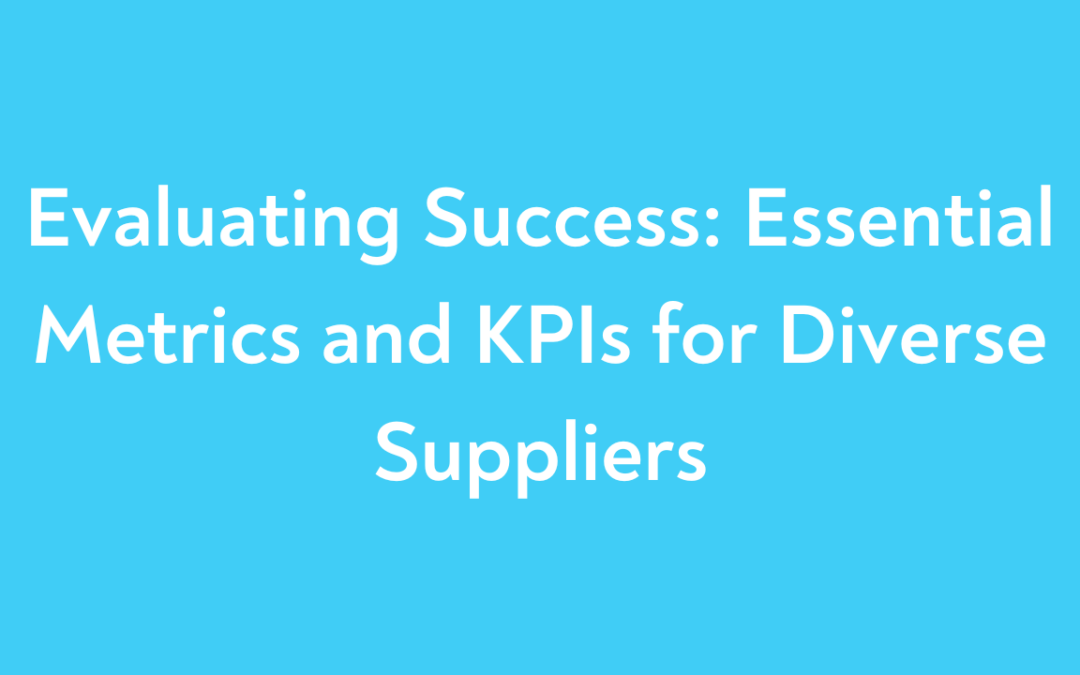Achieving success as a diverse supplier doesn’t end with securing contracts—it’s also about being able to measure and articulate that success to partners and potential customers. Key performance indicators (KPIs) and metrics provide a quantifiable measurement of your business’s performance, allowing you to track progress, refine strategies, and continuously improve your operations.
Sales and Revenue Growth
The health and success of your business fundamentally rest on sales and revenue growth. This metric, whether analyzed monthly, quarterly, or yearly, indicates your capacity to manage and fulfill larger contracts. Use an accounting system to provide accurate, up-to-date records that track sales volumes and earned revenue over specific time periods. Visualizing these trends in charts or graphs offers a clear understanding of your performance that aids you in making informed business decisions.
Customer Retention Rates
A testament to your reliability, quality, and customer service, customer retention rate also indicates your ability to meet and exceed expectations. High retention rates translate into repeat customers, contributing to your company’s overall stability and growth. Use a robust customer relationship management (CRM) system to gain insights into client engagement levels, transaction histories, and feedback. This data can be invaluable for tracking and improving customer retention.
On-Time Delivery Rates
On-time delivery rates are a clear demonstration of operational efficiency and reliability—qualities highly sought after in any supplier. Consistently meeting deadlines builds trust and enhances your appeal to businesses. Project management tools or supply chain management software can be effective for tracking delivery schedules, project timelines, and any delays, providing a transparent view of your delivery performance.
Quality Metrics
Quality metrics, although variable depending on your product or service, could include product failure rates, customer satisfaction scores, or return rates. Regular customer surveys and product inspections, managed through a quality management system, help monitor product quality and customer satisfaction levels consistently. This not only helps in refining your offerings but also strengthens your proposals to potential partners.
Certifications and Accreditations
Certifications from recognized diversity councils can significantly enhance your credibility. As your business grows, aim to secure relevant certifications and keep an updated portfolio or database of these accreditations. Platforms like Hire Ground allow you to showcase these credentials to potential partners and stand out in the marketplace.
Community Impact
As a diverse supplier, your impact on the local economy and community can be a significant selling point. Keep a record of your job creation, community initiatives, and local partnerships. Utilize surveys and local feedback to gauge the effectiveness of these initiatives. By highlighting this information in your annual reports and on your website, you can demonstrate your commitment to social responsibility.
At Hire Ground, we’re dedicated to helping diverse suppliers succeed. Our platform offers resources and tools to effectively track these essential metrics and KPIs. As a diverse supplier, your success extends beyond numbers—it’s also about your unique perspectives, commitment to quality and reliability, and your unique community impact. By making these elements the focal point of your measurement strategy, you’ll be well-equipped to secure more contracts and grow your business.
Key Takeaways:
- Sales and Revenue Growth: This fundamental measure of business health can be effectively tracked using an accurate accounting system. Monitoring these trends can inform business decisions and demonstrate your capacity to manage larger contracts.
- Customer Retention Rates: A testament to your reliability and quality, high customer retention rates indicate repeat business and growth. Utilize a robust customer relationship management (CRM) system to gain insights into customer engagement and feedback.
- On-Time Delivery Rates: Demonstrating operational efficiency and reliability, on-time delivery rates can be effectively tracked using project management tools or supply chain management software.
- Quality Metrics: These can be tracked through regular customer surveys and product inspections, providing a clear view of the value and consistency of your offerings.
- Certifications and Accreditations: Enhance your credentials with relevant certifications from recognized diversity councils. Keep an updated portfolio of these achievements and utilize platforms like Hire Ground to showcase them to potential partners.
- Community Impact: Your impact on the local economy and community can be a significant selling point. Record your job creation, community initiatives, and local partnerships to demonstrate your commitment to social responsibility.


Recent Comments